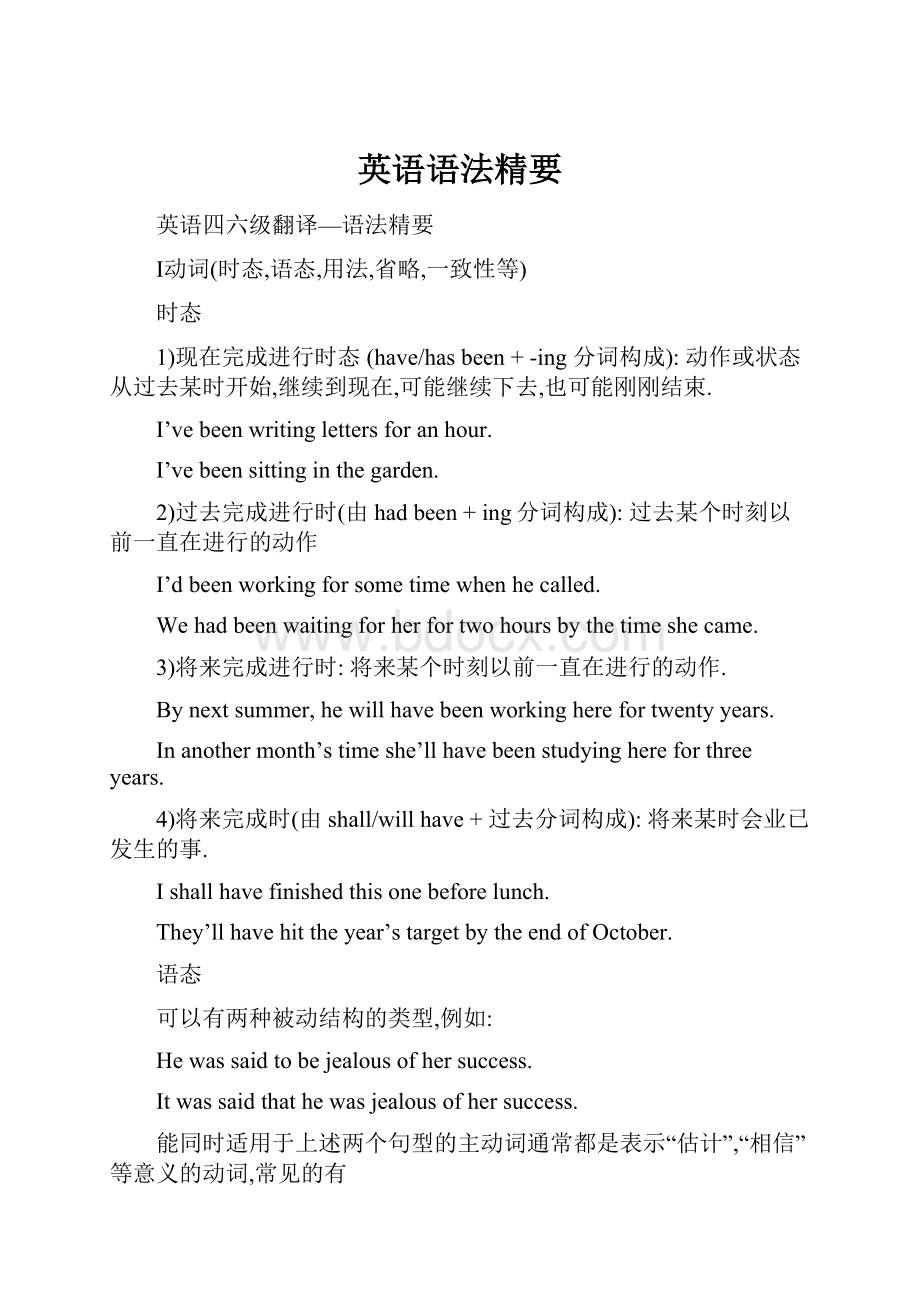英语语法精要.docx
《英语语法精要.docx》由会员分享,可在线阅读,更多相关《英语语法精要.docx(19页珍藏版)》请在冰豆网上搜索。

英语语法精要
英语四六级翻译—语法精要
Ⅰ动词(时态,语态,用法,省略,一致性等)
时态
1)现在完成进行时态(have/hasbeen+-ing分词构成):
动作或状态从过去某时开始,继续到现在,可能继续下去,也可能刚刚结束.
I’vebeenwritinglettersforanhour.
I’vebeensittinginthegarden.
2)过去完成进行时(由hadbeen+ing分词构成):
过去某个时刻以前一直在进行的动作
I’dbeenworkingforsometimewhenhecalled.
Wehadbeenwaitingforherfortwohoursbythetimeshecame.
3)将来完成进行时:
将来某个时刻以前一直在进行的动作.
Bynextsummer,hewillhavebeenworkingherefortwentyyears.
Inanothermonth’stimeshe’llhavebeenstudyinghereforthreeyears.
4)将来完成时(由shall/willhave+过去分词构成):
将来某时会业已发生的事.
Ishallhavefinishedthisonebeforelunch.
They’llhavehittheyear’stargetbytheendofOctober.
语态
可以有两种被动结构的类型,例如:
Hewassaidtobejealousofhersuccess.
Itwassaidthathewasjealousofhersuccess.
能同时适用于上述两个句型的主动词通常都是表示“估计”,“相信”等意义的动词,常见的有assume,believe,expect,fear,feel,know,presume,report,say,suppose,understand等.
Itissupposedthattheshiphasbeensunk.
Theshipissupposedtohavebeensunk.
担当besupposedto与不定式的一般形式搭配时往往表示不同的意义.例如:
Whyareyoudrivingsofastinthisarea?
Youaresupposedtoknowthespeedtoknowthespeedlimit.(你应该晓得速度限制)
双宾语及宾补结构的被动语态
双宾语结构的被动语态:
双宾语结构变为被动语态时,可以把主动结构中的一个宾语变为主语,另一个宾语仍然保留在谓语后面,但多数是把间接宾语变为主语.
Hewasaskedanumberofquestionsatthepressconference.
Twodayswereallowedthemformakingthenecessarypreparations.
宾补结构的被动语态:
ShewascalledBigSisterbyeverybody.
Thenhewasmadeasquadleader.
Hewasconsideredquitequalifiedforthejob.
Theroomwasalwayskeptcleanandtidy.
一致
如果主语是单数,尽管后面跟有with,togetherwith,aswellas,asmuchas,nolessthan,morethan等引导的短语,谓语动词仍旧用单数形式.
Terry,alongwithherfriend,goesskatingeverySaturday.
Anexpert,togetherwithsomeassistants,wassenttohelpinthiswork.
Thecaptain,aswellasthecoaches,wasdisappointedintheteam.
代词作主语时的一致
each,either,neither和由some,any,no,every构成的复合代词,都作单数看待.
Eachofushassomethingtosay.
Iseverybodyready?
Somebodyisusingthephone.
Neitherofushasgonethroughregulartraining.
Haseitherofthemtoldyou?
some,few,both,many等作复数
some可后接复数,也可接单数,表示某一.
none作复数看待时较多,但也有时作单数看待,主要看说话人脑中联系想到的是复数还是单数概念,但none在代表不可数的东西时总是看作单数:
Noneofthebooksareeasyenoughforus
Noneofusseemtohavethoughtofit.
None(=notasingleone)ofushasgotacamera.
None(=nobody)hasfeltitmorekeenlythanshedid.
Noneofthisworriesme.
all和most可后接复数,也可接不可数名词(allofthe…,mostofthe…),动词用单数.
由and或both…and连接名词词组时,后用复数;由notonly…but(also),either…or,neither…nor或or连接的并列主语,谓语通常和最邻近的主语一致.
Notonlytheswitchesbutalsotheoldwritinghasbeenchanged.
Mysisterormybrotherislikelytobeathome.
EitheryouorMrYangistodothework.
NeithermywifenorImyselfamabletopersuademydaughtertochangehermind.
如果一个句子是由there或here引导,而主语又不止一个,谓语通常也和最邻近的那个主语一致.
Therewascarvedintheboardadragonandaphoenix.
Hereisapen,afewenvelopesandsomepaperforyou.
people,police,cattle,poultry(家禽),militia(民兵)等通常都用作复数.
Cattlearegrazingonthepasture.
Thepolicearelookingforhim.
有些集体名词有时作单数看待,有时作复数看待,主要根据意思来决定.
Hisfamilyisn’tverylarge.
Hisfamilyareallmusiclovers.
Thecommitteemeetstwiceamonth.
Thecommitteearedividedinopinion.
Theaudiencewasenormous.
Theaudienceweregreatlymovedatthewords.
有些名词单复数同形,可根据意思决定谓语动词的数:
Thisnewseriesisbeginningnextmonth.
Thesenewseriesarebeginningnextmonth.
Thisspeciesisnowextinct.
Thesespeciesarenowextinct.
表示时间,重量,长度,价值等的名词,尽管仍是复数形式,如果作整体看待,动词也可用单数形式(当然用复数动词也是可以的):
Threeweekswasallowedformakingthenecessarypreparations.
Onehundredliwascoveredinasinglenight.
其他问题
书名,国家名用单数:
TalesfromShakespeareisabookbyCharlesLamb.
学科名,如mathematics,economics用单数.
manya或morethanone所修饰的词作主语时,谓语动词多用单数形式:
Manyapersonhashadthatkindofexperience.
Morethanonepersonhasinvolvedinthecase.
anumberof后接复数,thenumberof后接单数:
Anumberofbookshavebeenpublishedonthesubject.
Thenumberofbookspublishedonthesubjectissimplyamazing.
oneofthose后用单数.在“oneof+复数名词+关系分句”结构中,关系分句中谓语动词的单复数形式在一般情况下有两形式,一是根据先行词采用复数形式:
Joanisoneofthosepeoplewhogooutoftheirwaytobehelpful.
当one之前友theonly等限定词和修饰语时,关系分句谓语动词根据one而定,即采用单数形式:
Heistheonlyoneofthoseboyswhoiswillingtotakeonanotherassignment.
Ⅱ非谓语动词
不定式
形式
主动形式
被动形式
一般式
todo
tobedone
完成式
tohavedone
tohavebeendone
进行式
tobedoing
完成进行式
tohavebeendoing
完成式:
不定式的一般形式所表示的动作,通常与主要谓语表示的动作(状态)同时(或几乎同时)发生,或是在它之后发生.假如不定式所表示的动作,在谓语所表示的动作(状态)之前发生,就要用不定式的完成式.
Iamgladtohaveseenyourmother(=IamgladIhaveseenyourmother).
(比较:
Iamgladtoseeyou.)
Heissaidtohavewrittenanewbookaboutworkers.
Hepretendednottohaveseenme.
进行式:
如果主要谓语表示的动作(状态)发生时,不定式表示的动作正在进行,这时要用不定式的进行式.
Youarenotsupposedtobeworking.Youhaven’tquiterecoveredyet.
Wedidn’texpectyoutobewaitingforushere.
Hepretendedtobelisteningattentively.
完成进行式:
在谓语所表示的时间之前一直进行的动作,就要用不定式的完成进行式.
Thestrugglewasknowntohavebeengoingfortwentyyears.
Wearehappytohavebeenworkingwithyou.
被动式:
当不定式的逻辑上的主语是不定式所表示的动作的承受者时,不定式一般要用被动形式.
Itisanhonourformetobeaskedtospeakhere.
Shehatedtobeflattered.
Hewantedthelettertobetypedatonce.
Thisisboundtobefoundout.
Therearealotofthingstobedone.
Shewastooyoungtobeassignedsuchwork.
功用:
不定式可以作主语(a),宾语(b),表语(c),定语(d)或是状语(e).
a.Toscoldherwouldnotbejust.
b.Weareplanningtobuildareservoirhere.
c.Oneofourmaintasksnowistomechanizeagriculture.
d.Doyouhaveanythingtodeclare?
e.Wehavecometolearnfromyou.
不带to的不定式:
在“动词+宾语+不定式”结构中,如果动词是表示感觉意义的see,hear,watch,smell,feel,notice等,或是表示“致使”意义的have,make,let等,其后的不定式结构不带to.
Johnmadehertellhimeverything.
这类结构转换为被动语态时,后面的不带to的不定式一般还原为带to的不定式.
Shewasmadetotellhimeverything.
在hadbetter,hadbest,wouldrather,wouldsooner,wouldjustassoon,might(just)aswell,cannotbut等搭配之后,动词不定式也不带to.
I’drathernothaveeggsandbaconforbreakfast.
Theycannotbutaccepthisterm.
在makedo,makebelieve,letdrop,letfall,letfly,letslip,letdrive,letgoof,lettherebe,hearsay,heartell,leavegoof等固定搭配中,用不带to的动词不定式.
Johnletflyatorrentofabuseatme.
I’veheardtellofhim.
在动词help(或help+宾语)之后可用不带to的不定式,也可用带to的不定式.
CanIhelp(to)liftthisheavybox?
在介词except,but之后,如果其前有动词do的某种形式,不定式一般不带to,反之带to.
Thereisnothingtodoexceptwaittillitstopsraining.
Smithwilldoanythingbutworkonafarm.
There’snochoicebuttowaittillitstopsraining.
连词ratherthan,soonerthan置于句首时,其后的不定式不带to.
Ratherthanpushthebookbackashewantedtodo,heforcedhimselftopickitup.
出现在句中其他位置时,其后的不定式有时带to,有时不带to.
Hedecidedtowriteratherthantelephone.
Themanagerbelievesitisimportanttoinvestinnewmachineryratherthantoincreasewages.
用作补语的动词不定式,如果主语是由“all+关系分句”,“thing+关系分句”,“what分句”或“thing+不定式结构”等构成,并带有do的某种形式,这时,作为主语补语的不定式可以省to,也可以不省.
Whathewilldois(to)spoilthewholething.
Allyoudonowiscompletetheform
TheonlythingIcandonowisgoonbymyself.
Thethingtodonowisclearupthismess.
TheleastIcandoisdriveeverybodyelseclosertotheissue.
Ⅲ虚拟语气
that从句中:
wish,wouldrather(sooner),hadbetter:
suggest,order,demand,propose,command,request,desire,insist等动词后的宾语从句:
Thecommanderorderedthatallcivilians(should)beevacuated.
itisdesired,itissuggested,itisrequested,itwasordered,itwasproposed,itisnecessary,itisimportant,ithasbeendecided等结构后的主语从句中.
Itwasarrangedthattheyleavethefollowingweek
Itwillbebetterthatwemeetsomeothertime.
suggestion,motion,proposal,order,recommendations,plan,idea等后面的表语从句和同位语从句:
Hissolerequirementis(was)thatthysystembeadjusted.
Ⅵ定语从句
限制和非限制性定语从句:
限制性定语从句是名词词组不可缺少的一个组成部分,去掉了会造成病句或意义不明确;非限制性定语从句属于补充说明性质,去掉了不会影响主要意义,通常用逗号与它的先行词分开.
Theboyswhowantedtoplayfootballweredisappointedwhenitrained.
Theboys,whowantedtoplayfootball,weredisappointedwhenitrained.
如果定语从句的先行词是专有名词,或是带有形容词性物主代词(my,his,etc)或形容词性指示代词(this,that,etc)作限定词,其后的定语从句通常都是非限制性的:
MarySmith,whoisinthecorner,wantstomeetyou.
Hermother,whohadlongsufferedformarthritis,diedlastnight.
Allthesebooks,whichhavebeendonatedbyvisitingprofessors,aretobeusedbythepostgraduates.
在非限制性定语从句中只能用who/whom指人,用which指物,通常不用that替代.
Myfather,whohadbeenonavisittoAmerica,returnedyesterday.
Allthebooks,whichhadpicturesinthem,weresenttothelittlegirl.
定语从句的引导词
that,who,whom:
非限制性定语从句,如果修饰人,一般用who,有时用that(作主语时用who较多).如果关系代词在从句中作宾语,就应当用宾格whom或that,但在大多数情况下都可以省略掉,在口语中可用who代替whom.
Hereistheman(whom)you’vebeenlookingfor.
Heisaman(that)youcansafelydependon.
Thepeople(who/that)youweretalkingtowereSwedes.
TherearesomepeopleherewhoIwantyoutomeet.
但在介词后只能用whom:
ThisisthemantowhomIreferred.
但在口语中一般都把介词放到句子后面去,这时可用that,但省略时更多一些.
Haveyoumetthepersonaboutwhomhewasspeaking?
Haveyoumettheperson(that)hewasspeakingabout
ThegirltowhomIspokeismycousin.
Thegirl(who/that)Ispoketoismycousin.
限制性定语从句如果修饰“物”,用关系代词that的时候较多,也有时用which..当这个代词在从句中是用作宾语时,在绝大多数情况下都是省略的,特别是口语中(尤其是当被修饰的词是all,everything等词时):
Haveyoueverythingyouneed?
(Isthere)anythingIcandoforyou?
Allyouhavetodoistopressthebutton.
在介词后只能用which,在口语中一般都把介词放到从句后部去,这时可以用that,但省略的时候更多一些:
Thetoolwithwhichheisworkingiscalledawrench.
Thetool(that)heisworkingwithiscalledawrench.
Thisisthequestionaboutwhichwe’vehadsomuchdiscussion.
Thisisthequestion(that)we’vehadsomuchdiscussionabout.
定语从句一般是修饰名词或代词的,但间或也可以修饰整个句子a),或是句子的一部分b),引导词用which: